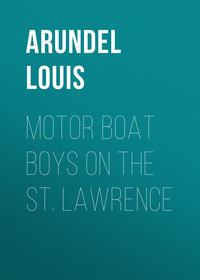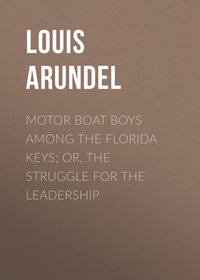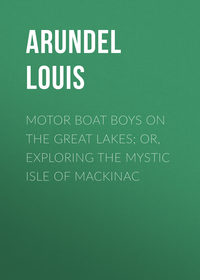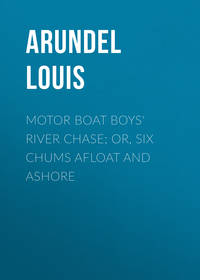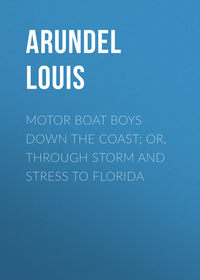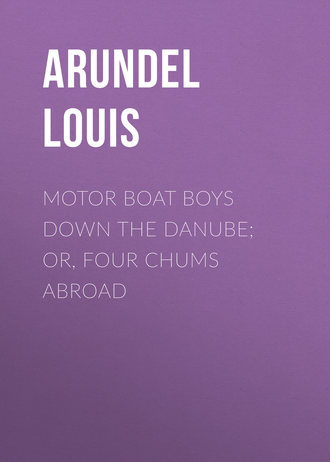 полная версия
полная версияMotor Boat Boys Down the Danube; or, Four Chums Abroad
Still, it was good to find the officer nodding his head as he gleaned something of the contents. At least he could see it was genuine, and that counted for a good deal.
“I am quite satisfied now that you are just what you claim to be – tourists, who have no connection with our enemies, or those who in a short time we must look on as such. You are wondering, no doubt, why I went so far as to pry into the contents of your letter from home, and I believe an explanation is due. To tell the truth, we rested under the belief that you were four desperate young Serbian youths, who were said to be on their way up the Danube bound for Vienna, with the mad intention of trying to assassinate our good kaiser, Francis Joseph, just as the Austrian heir apparent to the throne was killed not long ago.”
Buster could not keep from giving a little gasp at hearing this. Really never before, so far as he knew, had he been taken for a desperado. He did not know whether to be ashamed or flattered. It would be something with which to thrill those boy comrades at home, if ever they were lucky enough to get safely back again.
“That would be a serious charge against us, I am sure,” said Jack; “but it pleases us to know that you are now convinced we are not what you thought. Seeing four strangers in a boat, and all young at that, of course made you suspicious.”
“The fact that you were headed down-stream puzzled us considerably,” continued the officer, apparently willing to explain things in order to prove that he and his comrades were only doing their duty; “but we figured that something may have caused a change in plans, perhaps the breaking out of war, and that the four desperate Serbians were on the way back to their native land.”
“After all, we should not be sorry for what has happened,” diplomatic Jack went on to say, “since it has given us the pleasure of meeting three such excellent gentlemen. I hope, though, there need be no necessity for causing us to alter our plans, since our hearts are set on finishing the voyage, and we will never have the opportunity for visiting your great country again.”
Every one of them held his breath while waiting for the officer to make a reply to this question. He looked around at the half circle of anxious faces and smiled indulgently. No doubt just then he put himself in their place and tried to realize how much it might mean to be simply let alone.
“I do not mean to demand that you turn back,” he finally told Jack, “for that would really be exceeding my authority; but I would feel that I had not done my full duty if I did not warn you of the perils you will likely encounter below here. By the time you reach the Serbian border it is more than likely there will be desperate fighting going on between Hungarians and Serbians, for they are ready to-day to fly at one another’s throat. You will find yourselves in great danger before you can pass the Iron Gate and enter Rumania.”
Jack only smiled reassuringly at him.
“Thank you many times, sir, for taking enough interest in us to give that kind warning,” he remarked warmly; “but we have passed through some pretty lively adventures in the past and always managed to come out safely. We will try and be careful how we act when the time comes; and once past the Serbian border along the Danube we need fear little else.”
“Well, I admire your boldness, while at the same time I fear you may be making a mistake. We will wish you a pleasant trip, and that you reach your goal in safety. What are your plans after arriving at the sea, may I ask?”
“We have arranged to send the boat back to the owner at our expense,” explained Jack. “Then we will find some way of getting to Constantinople, where we hope to remain a short time, looking around. From there we go to Italy, and then back to London to sail for home about October fifteenth.”
“Ah! what wonderful things may happen in those ten weeks!” remarked the officer, as though he might be trying to lift the veil that hid the future. “History will be in the making, I fear, and all Europe be torn up with the war clouds. But better so than the armed peace that has existed so long. A storm is necessary once in so often to clear the atmosphere which has become murky.”
He thrust out his hand to Jack, who gladly seized it.
“May the best of luck follow you all the way, is the wish of myself and my comrades here,” the tall officer told them as in turn he pressed each boy’s hand, in which genial undertaking he was followed by the other pair, who, although taking no part in all the talking, had been earnest listeners.
Then the speed boat backed away, made a sweeping turn, and was soon heading up the Danube again. The boys waved their hats to the three gaily dressed Hungarian soldiers seated in the other craft, and were in turn saluted by the trio.
After that Jack again started the engine, and they began moving with the current at a lively rate.
“Well, that was a new experience, now!” exclaimed Josh; “and we are mighty lucky to have escaped being taken back to Budapest and shut up in a dungeon.”
“Yes, it was easy, after all,” grumbled George; “but who’d think Hungarian officers would know English so well?”
“And just to think of our being taken for a lot of desperate Serbian youths sworn to get the aged and benevolent Emperor Francis Joseph! Ugh! it’ll give me a shiver every time I think of it. I never dreamed before that I looked like a fellow who would take his life in his hand to do such a terrible thing.”
CHAPTER V
SIGNS OF COMING TROUBLE
All day long the powerboat kept constantly moving down the reaches of the Danube River. Many were the interesting sights the boys looked upon from time to time. Nor did they see any particular signs of overhanging trouble. War may have been declared by Austria-Hungary upon Serbia and Russia, backing up the action of her ally, Germany, but the indications of it were not immediately apparent.
It was true that in several towns which they passed on that morning’s run they could see that groups were in the streets, and there seemed to be many men in uniform hurrying this way or that. Once they also saw a field battery of glistening guns disappearing up a steep road that led to the south.
“You can see what’s in the wind, all right,” Josh remarked, as they watched a group of uniformed horsemen galloping along the river road as though bound for some distant point of mobilization. “In a few days after the call to the colors, as they say, has gone out for many classes of reserves, the whole country will be swarming with men in uniform.”
“I only wish we could hold over and see what goes on,” grumbled George. “It’s a chance in a lifetime to be a looker-on in a foreign country, with war breaking out; and I think it’s a shame that we are going to miss it.”
Jack took him to task for saying that.
“We ought to thank our lucky stars, on the other hand, George,” was the way he put it, “that we have a chance to get out of Austria before every exit is closed. I wouldn’t be surprised if a lot of tourists have the time of their lives escaping, because, you see, every train will be taken over by the Government for carrying soldiers, guns, ammunition, horses, stores and such army necessities.”
“Yes,” added Buster, “that’s what I say, Jack. For one I want to tell you I’m mighty thankful to be on board this old boat right now. I only hope they won’t want to commandeer it for carrying soldiers down to the Serbian border.”
“Oh, they wouldn’t want to bother with such a mosquito craft as this, I should think,” remarked Josh uneasily.
“Our little flag seems to attract a heap of attention,” Buster continued, with a vein of pride in his voice, for that small edition of Old Glory was his private possession, it may be remembered.
“Where we landed at noon to see if we could buy some eggs and milk at that farm house,” Josh observed, “those peasant girls were examining it. I rather think they must have somebody over in our country, for when I said the word ‘America’ and pointed to the flag and then myself they laughed and nodded their heads.”
“And don’t forget to mention, please, George, that we got the eggs all right,” suggested Buster; “likewise a bumper mug of fresh milk apiece, and some butter that didn’t have a bit of salt in it, which I think queer.”
“Oh, so far as that goes,” explained Jack, “there’s lots of that made and sold over here. They call it sweet butter, and most people like it. You’d get used to it in time.”
“Four dozen eggs, and whoppers at that,” Buster went on to say, gloatingly; “which I consider a splendid investment; and we didn’t have to pay half what they’d cost us in the States either. I’m going to have a couple fried for my supper, and anybody else that likes them that way can get what they want by giving the tip now.”
They continued to chatter in this manner as the afternoon wore away. It had been decided that while there was a full moon that night they had better not attempt navigating the river after the sun had set. None of them knew what they might run up against; and besides, since war had come, possibly there would be strict rules enforced prohibiting such a thing during the night. None of them felt like taking chances.
Buster, it seems, must have been thinking of some of his previous exploits in the times that were gone, for later on he was seen to be looking over some fishing tackle he produced from his pack.
“Hey! what’s in the wind now, Buster?” sang out Josh upon discovering what the fat chum was doing.
“Oh, nothing much,” replied the other easily, “only it struck me that there might be some kind of eatable fish in this same blue Danube, and I’m looking over my lines. To-night, if I can find any fat grubs or worms, I might set a line and see what happens. You know I’ve had more or less success about grabbing big fish out of fresh and salt water.”
That seemed to make the others laugh, as though certain humorous memories were refreshed. Buster joined them, for he was a jolly fellow and could even enjoy a joke when it was on himself.
“I mean to drop one of these lines over as we go along, so as to soak the snell of the hook, for if it’s too dry it might break,” Buster explained.
“Well, here’s wishing that you meet with good luck,” said Josh, “because I’d enjoy a supper of fresh fish pretty good.”
“Don’t make up your mouth for it, then,” warned George, “because you never can tell about such things. Fish are what some people would call notionate; they bite well one day and then given you the grand laugh the next one.”
“About how far do you think we’ve come since leaving Budapest, Jack?” Buster asked, not deigning to continue the discussion with George.
“I should think something like fifty to sixty miles,” was the reply.
“Whew! as much as that?” whiffed George.
“Well, this current must be all of four miles an hour, and the old boat when going with it ought to average ten. Counting for our stops and all that, we’ve certainly covered sixty miles if we have one.”
“I agree with you, Jack,” said Josh; “George is only saying that to be contrary.”
“Oh, I am, eh?” grinned George, who seemed to take especial delight in stirring Josh up.
“It’s been a pretty good day for August, with the sun shining overhead most of the time, and not so very hot at that,” Buster continued. “There’s no sign of such a thing as a storm that I can see – great guns! what in the mischief can that queer-looking thing be over yonder? Do they have birds shaped like a fat cigar in the Danube country?”
Of course, every one immediately twisted his head around to take a look, and all sorts of exclamations announced that they were about as much astonished as Buster.
Low down toward the horizon they saw an object outlined against the sky that was undoubtedly moving, for they could notice that it passed a small cloud with considerable speed. Just as Buster had said, it looked very much in the distance like a fat cigar, and was of a neutral tint, not very easily distinguished against the heavens.
“Why, that must be one of those German Zeppelins we’ve read so much about!” exclaimed Jack, after taking a second look.
“A war dirigible, you mean, don’t you?” demanded Josh.
“Nothing else,” he was told. “I’ve seen pictures of them often, but never thought I’d set eyes on one. Yes, it’s a Zeppelin, all right, and heading due south, too.”
“What d’ye mean by saying that last?” asked Josh.
“Well, you remember what that officer said about the Serbians and Austrians on the Danube down below, where it acts as a boundary line, being ready to fight at the drop of the hat? Perhaps they’re already having it hot and heavy. Perhaps the word has been flashed over the wires for one of the Zeppelins to come down and get busy there.”
“What would they use it for, Jack?” questioned Buster, as all of them continued to watch the steady movement of the fast dirigible in the west.
“I believe the main thing for Zeppelins to do is to carry explosives and drop bombs from a great height on forts and barracks occupied by the enemy forces. But they can be also used for scouting and bringing back information of value. That may be what they want this one down along the Danube for.”
So fast was the dirigible going that in a quarter of an hour more it had passed beyond the range of their vision.
“Looks like things are going to happen right along over in old Europe these days,” remarked Josh.
“Yes, but we’ll know next to nothing about it all,” George went on to say; “for we can’t buy a paper, and even if we did none of us could read Magyar. This thing of knocking around in a foreign country may be all very good when there’s no war on, but there are times when you’d like to be able to buy an extra and learn all that’s happening.”
“There’s a good landing by that tree yonder, Jack,” remarked Josh.
“But we’re not quite ready to pull in yet a while,” the commodore announced.
“What’s the hurry, Josh?” asked Buster, again working at his long and strong fish line.
“Oh, I thought George wanted to get out and start right away back,” answered the other with a dry chuckle. “He’ll never be happy until he can have all the comforts of home, including the afternoon extra to read.”
“Forget it!” snapped George. “I’ve always been able to take things as they came as well as the next one, and I reckon I can stand what you fellows do. Because I grumble a little once in a great while, that’s no sign I’m not having a good time. Some of my folks must have been sailors, I guess, and it runs in the blood. Don’t pay any attention when you hear me complain.”
“We’ll try not to, George,” promised Josh blithely; “we’ll have to remember the source, and then forget it.”
“There, now, I’ve got the silly old line untangled,” announced Buster; “and I’ll let the hook and sinker trail after us, just to make believe I’m fishing. It’ll do me a heap of good to feel the twirl as the hook goes around with the swivel – sort of revive old memories like.”
He lay there by the broad stern of the boat amusing himself after his fashion. Josh could not resist the temptation to warn him.
“Better look out for yourself, Buster,” he remarked seriously. “Some hungry fish might snap at your bare hook and get caught. If you were taken off your guard the next thing you knew you’d be overboard.”
“It wouldn’t be the first time, either,” mentioned George.
“Aw, no danger of that happening,” retorted Buster good-naturedly. “Even over here in Austria-Hungary the fish have their eye-teeth cut, and wouldn’t be so green as to bite at a bare hook. If I had anything to bait it with I’d watch my steps, you may be sure. But don’t worry yourself about me, either of you. I can take care of myself.”
No more was said just then with reference to the subject, something else coming up to catch their attention.
The afternoon was nearing its close, and Jack knew that before a great while they must be on the lookout for a place to haul up for the night. Whether they had better select a retired nook for their camp, as had been their habit when cruising down home rivers, or land near some farm, he had not yet decided. Of course, it would be unwise to stop over at any town, since they might have more or less trouble getting away again if the authorities chose to be exacting.
“There goes a long train over there, heading south, too,” remarked Josh, pointing as he spoke.
“Seems like nearly everything is going the same way we are, for a fact,” added George.
“It strikes me it must be a troop train,” Jack was saying, “for, while I’m not dead sure, I think I can see men in uniform leaning from the windows of the carriages, as they call the cars over here.”
“Well, what else could we expect?” Buster wanted to know. “If Austria means to give little Serbia a licking she’ll need a lot of her soldiers down there, many more than she’s got along the lower Danube now. Yes, they’re soldiers, all right, Jack. I can see them plainly in the sunlight.”
“The plot is thickening,” remarked George solemnly; “and right now I wouldn’t be surprised if the Germans were having a hot time over in Belgium, if they’ve really started to cross the little kingdom. They say those Belgians are fighters to the backbone, and will never stand by to let the Kaiser cross their neutral country to strike at France.”
George was deeply interested in all that was going on. He took pride in his knowledge of things connected with the aspirations of these countries, big and little, of Europe, and especially of the turbulent Balkan States. While George undoubtedly has his failings, as what boy has not, as a rule he seemed well informed, and could argue on almost any point.
“A lot of those fine chaps will like as not never come back,” said Buster, as he gave the fish line another idle hitch around his wrist, preparatory to winding it in; “they start out full of enthusiasm and life, and are brought home again wrecks, fit for only the scrap heap.”
“Listen to Buster, will you?” chuckled Josh; “he’s getting to be a regular old philosopher these days.”
“Well, it always did hurt me more or less when it came to parting with any one I cared for a heap,” admitted the fat chum, trying to look serious, though that was always a difficult task with him, because nature had made his round features to bear the stamp of a jovial disposition; “you may remember that it took me two whole days to recover when we left home. I’m of a clinging nature, you see, and this thing of severing the bonds goes against my grain.”
He had just said this when something happened that astounded the others. Buster seemed to be dragged from the end of the moving powerboat as though an octopus had suddenly flung one of its long tendrils up and clasped him.
The others heard Buster give one loud howl of fright, and then the sound was swallowed up in a splash as he disappeared in the river.
As Jack hastily stopped the engine and prepared to back up, he had a glimpse of the stout chum struggling desperately in the water. If his frantic actions counted for anything, it would seem as though Buster must be engaged in a life-and-death struggle with some marine monster that had pulled him from the after deck of the powerboat and into the river.
CHAPTER VI
THE CAMP ON THE RIVER BANK
“Keep a-going, Buster; we’re coming back for you!” shrilled Josh, not a little alarmed on account of seeing such a tremendous splashing back where the stout chum was struggling in the river.
Being compelled to fight against the steady current, the boat could not make such very rapid progress, especially when backing up. Still it seemed as though Buster might be swimming toward them. He was using only one hand, and churning the water like the paddle-wheel of a Mississippi steamboat.
“Whew!” they heard him say, after ejecting a stream of water from his mouth, which he persisted in keeping open; “a sockdolager, I tell you! Going to beat all the records this time. It must be a river horse, or a boss sturgeon, boys. I want to save him, you bet!”
Evidently, like a true fisherman, Buster’s first, last and only thought concerned the successful landing of the game he had struck. And presently the boat had come so close to the submerged boy that Jack stopped the engine lest the propeller do Buster some material damage.
Two of them leaned over the stern and with great difficulty managed to drag the water-soaked chum aboard.
“Sit there in the stern until you drain, Buster,” ordered Jack. “If we took all that water aboard we’d be in danger of foundering.”
“What ails your left hand?” demanded Josh.
“Why, don’t you see,” explained George, “the silly went and wound the line about his wrist. Then when the fish took hold it was a case of Buster going overboard or having his left arm pulled out of its socket. No wonder he lets it hang down like that now. I bet you it hurts like fun.”
“But say, the bally old fish has quit pulling like mad!” exclaimed Buster, as though that circumstance troubled him much more than any bodily pain he might be enduring.
Josh leaned forward and took hold of the line. He even started to pull it in after the manner of a skillful fisherman, while Buster eyed him eagerly.
“Tell me you feel him pulling yet, Josh, can’t you?” he pleaded. “Don’t break my heart by saying he’s gone! After all my fight I deserve to land that monster.”
Josh chuckled.
“I do feel something now, all right, Buster,” he remarked. “Watch me yank him alongside in a hurry. You never could handle such a monster with one of your arms next to useless.”
So Josh worked away, possibly putting on more or less, as though he were having the time of his life in trying to drag the captive alongside. Every little while he pretended to lose a foot or so of line, whereupon Buster would call out anxiously and beg him to keep a tight hold on the glorious prize.
“Talk to me about having fish for supper,” the dripping sportsman cried as he watched for the first glimpse of his catch; “why, we could feed a whole village on such a dandy as this. And caught on a bare hook, too! Ain’t I the lucky one for keeps? What d’ye know about that?”
“There he comes, Buster!” cried Josh, pantingly; “get ready now to help me pull him up over the stern, all of you. My stars! but how he does fight.”
In another moment Josh drew alongside a small but broad-nosed log, which in floating with the current of the river had suddenly been snagged by the bare hook. The impact, with the boat running as it was, had been severe enough to drag the fisherman into the water, for the stout line held, and he had foolishly wrapped one end of the same around his left wrist.
Jack and George shouted with mirth, and Josh excelled them both. Buster looked down at the now tamed “fish,” felt ruefully of his lame arm, and then grinned.
“You bit, all right, fellows!” he blandly told them; nor would he offer any further explanation, so that to the end of the chapter none of them really knew whether Buster had been playing a trick on them or not by pretending to fight the object at the end of his line and showing such tremendous solicitude while Josh was pulling in the same.
“What am I going to do about drying off?” asked Buster a little later, after he had succeeded in reeling in all his line without getting it very much tangled – the log he allowed to float off on the current, having no use for it, though Josh did ask him if he had never heard of “planked fish.”
“You’re draining right along,” George told him; “and as the weather is so nice and warm there’s no danger of your taking cold, I guess.”
“When we get ashore,” Jack explained, “we can start a fire, and that will give you a chance to get dry. But I’m sorry about that arm, Buster. It may give you some trouble, because the jerk must have been fierce.”
“Well, I should say it was,” admitted the other, with a sigh. “I thought my arm would come off sure. But then the excitement kept me up, you see. And I knew right well you’d stop the boat and come back after me. But Jack, later on I want you to rub my arm with that liniment you carry with you. Chances are it’ll be black and blue along the muscles. It hurts like fun even now.”
Jack considered that the sooner this was done the better, so he turned the wheel over to George, and bidding Buster bare his arm, proceeded to give it a good rubbing with the liniment he knew to be fine for this purpose.


